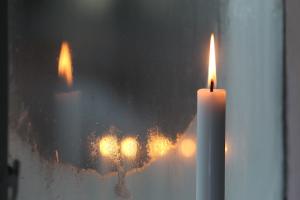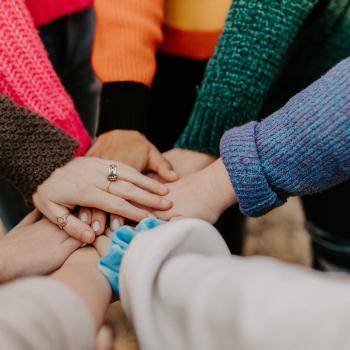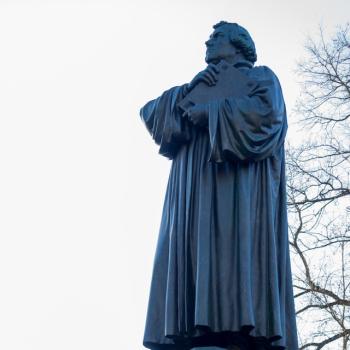There was a time in my life when I found it comforting to sing a particular worship song loosely based on the Apostles’ Creed. The lyrics were meaningful to me as a way of expressing our shared beliefs as a faith community. Sometimes, if I remember right, we would even change some of the “I”s to “we”s. As in, “We believe in God our Father,” and so on. These days, though, I wonder: What does it mean to say “we believe”?
Can We Just Believe Ourselves Into Hope?
The other day, two Jehovah’s Witnesses came to our door. While I was planning to pretend I wasn’t home, my husband was kind enough to answer. He spent a few minutes talking with them.
I eavesdropped from another room as they asked him whether or not he felt a sense of hope about our world. He answered.
I’m not sure it mattered much what he said. They had a predetermined spiel about how God gives us hope and such, because the Bible says so, and here are the scripture passages that show us.
There was a lot of talk of what “we believe.” (I’m reminded of something some folks at a former church used to say: “The Bible says it, I believe it, that settles it.” Sigh. The Bible is so more complex than that.)
The Jehovah’s Witnesses left my husband a tract I didn’t read. But I was left wondering: What does it even mean to collectively believe something as a religious community? What does it mean to say “we believe”?
Sure, we have some choice, sometimes, as to what we believe. But we also find some things hard to believe—and other things impossible—because of our life experiences, or the experiences of people we know.
And hope is a complicated thing. I don’t think it’s as simple as saying, This scripture verse says that God will come and save. We believe that. Therefore we have hope.

Does Any Group Really All Believe the Same Things, Anyway?
A while back, I reflected on the complications of church belief statements. (And then I reflected on, well, the complications of these complications.)
I think part of the problem with church belief statements is that they tend to raise all sorts of unanswered questions about what it actually means to “believe” the things they say.
What is belief?
If a group really does all think the exact same things, perhaps it’s not really “belief”—in the sense that people have sorted through what makes sense to them, feels right in their gut, and honors their own experiences and the experiences of others. Perhaps it’s more regurgitation—people being encouraged to passively absorb and unthinkingly repeat the things authority figures are teaching.
Perhaps these authority figures see themselves as the community’s answer-givers. Perhaps they don’t really want people to learn to authorize themselves.
For me, the point of a church community is not to be in a room on Sunday mornings with a few dozen or a few hundred people who think exactly the same way I do. That’s terrifying. There’s no room for us to challenge one another, to be transformed, to grow together.
Even though it’s hard sometimes, I think we’re meant to recognize that we’re all different. And that it’s good that we’re different. We don’t have to all believe the same things in order to practice faith together, to learn from one another, to be open to changing our minds.
Religion as Correct Doctrine Is a Western Invention
I’ve found it helpful to learn that not all faith communities put the same sort of emphasis on doctrine and so-called “orthodoxy” as Western Christianity often has. Trying to get everyone to believe the same thing is a particular type of exercise of authority. Faith communities do not have to be this way.
In Indigenous Theology and the Western Worldview: A Decolonized Approach to Christian Doctrine, Randy Woodley reflects on the differences between Western and Indigenous worldviews when it comes to belief and practice:
“My sixty-three years of experience in America have taught me that beliefs are basically everything to Western folks and the practices and values in the worldview are just a part of that, but not a big part of it. In an Indigenous worldview, all of life is spirituality, beliefs are de-emphasized, spirituality is passed on primarily via observation and participation or practices” (61).
I think it’s good to know that a Western emphasis on particular beliefs is not the only way of seeing things.
I like the idea of spirituality, faith, or religion being passed along from one person to another not by someone telling someone else what to believe, but instead by “observation and participation.” We share spiritual practices together. We participate in rituals that help us connect with God, care for one another, and understand who we are in this world.
Sure, there are beliefs that lie behind these practices. But being able and willing to regurgitate specific doctrines with precision is not the point. Seeking God together through shared spiritual practice is.
From “We Believe…” to “We Want to Be…”
Maybe who do we want to be as a community? is a more productive question than what exactly do each of us as individuals believe? Maybe we can shift from focusing on what “we believe” to what kind of people we want to become together.
It’s okay if some beliefs work for some people and not others. And the only way we can have honest conversations about our truest beliefs is if a faith community is a safe place to think differently.
We can be united, maybe, by the traditions we share. Hopefully, by some shared values that we develop together. Definitely, by our unconditional love for one another.
We can question the beliefs handed down to us. We can develop the courage to speak honestly about what we do and don’t believe. We can resist the urge to try to tell others what to believe.
And maybe, in the real community that is born through all of this, there is hope.












